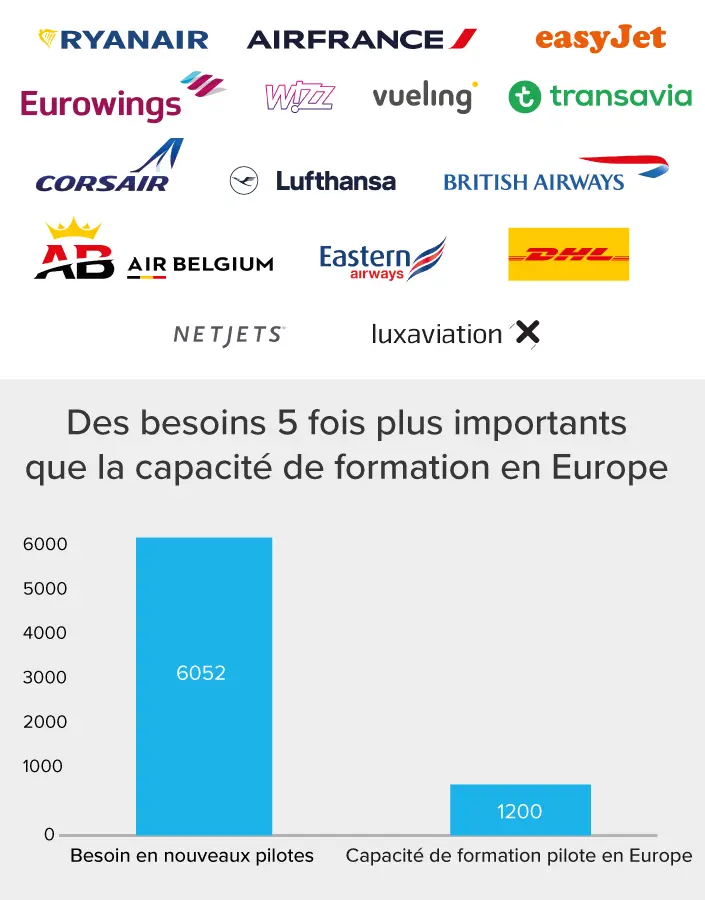« PÉNURIE DE PILOTES À PARTIR DE 2023 » P. MILWARD
Tous les feux sont au vert. Il est officiellement permis, non plus seulement d’espérer, mais de croire à la reprise des embauches massives de pilotes. Les constructeurs, opérateurs et instances représentatives parlent d’une même voix, chiffres à l’appui. Astonfly a synthétisé pour vous leurs perspectives, rapportées par divers medias aéronautiques et économiques.
Nous le disions il y a quelques mois, une grande différence oppose les crises traversées précédemment par le secteur aéronautique et celle de 2020. La crise du covid a été due, non pas à une baisse de la demande de voyages mais à l’impossibilité de voyager. C’est pourquoi dès que les conditions de voyage s’assouplissent, les passagers sont de retour.
Dans certains pays, le trafic dépasse celui de 2019. Tant le tourisme, que les impératifs professionnels ou encore le fret dopé par le e-commerce vont créer un appel dans les cockpits. L’heure est au recrutement pour nombre d’opérateurs – des majors aux compagnies régionales en passant par l’aviation d’affaires et générale et les low-costs.
Alors qu’à l’aube de 2020 une pénurie de pilotes s’annonçait, l’arrêt brutal des campagnes de recrutement, et les plans de départs anticipés des pilotes seniors vont s’ajouter au facteur de la croissance industrielle et touristique.


Les constructeurs confirment la tendance à la hausse
La reprise d’abord estimée entre 2023 et 2025 est désormais certaine pour 2022. Elle est déjà là, depuis la reprise du trafic régional, en Chine, puis aux Etats-Unis et maintenant en Europe[1]. À tel point qu’Airbus a revu ses objectifs dès l’été 2021[2]. Le signal le plus fort est sans nul doute le retour des commandes « géantes ». Au premier semestre 2021, Airbus avait livré 297 appareils, soit 100 de plus qu’à la même période en 2020[3]. Si lors de ce bilan de mi-année, le niveau d’avant crise n’avait pas encore été retrouvé, Airbus vient d’annoncer, lors du salon aéronautique de Dubai, plus de 400 commandes[4].
Mêmes projections de la part du rival américain : Boeing estime à 8 700 le besoin en avions neufs pour satisfaire le marché européen d’ici à 2040 ; et à plus de 3% la croissance annuelle du trafic passagers[5].
Dans un rapport consacré à l’embauche des personnels techniques, et intitulé Pilot and technician outlook 2021-2040[6], l’avionneur de Seattle donne un nombre à 6 chiffres : 612 000 pilotes devront rejoindre les rangs des compagnies aériennes dans les 20 prochaines années, dont 115 000 en Europe. Dans ce même rapport, Boeing insiste sur l’impérieuse nécessité de former en continu afin de conserver un vivier de pilotes disponibles pour les opérateurs. Et d’ajouter : « les candidats pilotes qui débutent leur formation aujourd’hui seront très bien placés pour bénéficier des opportunités au moment de leur diplôme. »
Autre indicateur, l’éclaircissement de l’horizon relance la vieille bataille commerciale entre Airbus et Boeing[7].
Chez les opérateurs, les portes s’ouvrent
En juin dernier, Delta Air Lines annonçait déjà un besoin de 1 000 pilotes pour l’été 2022. American Airlines a recruté 300 nouveaux pilotes en 2021, et en accueillera le double en 2022. Southwest Airlines, sans donner de chiffres, ouvre également les bras, cela malgré sa réserve de pilotes en congé. United voit plus loin et vise 10 000 embauches d’ici 2030[8].
Les compagnies régionales américaines vont jusqu’à proposer des primes à l’embauche par crainte de manquer de candidats…[9]
Sur le vieux continent, Air France poursuit sa politique de renouvellement de flotte, avec notamment le dernier-né Airbus A220, et rouvre des lignes. En mars 2022, la compagnie nationale aura retrouvé 90% de son offre 2019[10].
Wizz Air affirme qu’elle recrutera 4 300 nouveaux pilotes d’ici 2030. Elle en a déjà formé 150 supplémentaires afin de couvrir la capacité de l’été dernier, à plus de 100% des remplissages pré-covid. La compagnie hongroise a d’ores et déjà ouvert une plateforme de candidature en ligne[11]. Même mobilisation du côté de Dublin, Ryanair souhaite recruter 2 000 pilotes dans les trois ans qui viennent, puis 500 par an[12].
EasyJet, quant à elle, vient d’annoncer le rerutement de 1000 pilotes sur 5 ans. Pour ratisser le plus largement possible, elle lance une campagne publicitaire afin d’attirer tous les profils, du DJ à la mère de famille multitâches[13]. Rien de surestimé quand on sait que l’Europe aura besoin de 5000 pilotes pour suivre le rythme des commandes d’avions, alors que les écoles européennes n’ont pas la capacité de former plus de… 1000 pilotes par an !
C’est un autre son de cloche – ou plutôt d’alarme – que celui qui résonait en 2020. Le pessimisme a changé de camp : les plus inquiets redoutent désormais une lourde pénurie de pilotes d’ici à cette fin d’année, avec peut-être des avions maintenus au sol par manque de navigants.
À ce niveau de la lecture, nous avons seulement donné les perspectives pour les pilotes de lignes régulières.
Les prévisions sont tout aussi voire plus optimistes pour l’aviation d’affaires, qui fait rêver nombre d’élèves pilotes, par la diversité de sa flotte et la polyvalence des missions. Ce secteur qui depuis deux ans a attiré de nouveaux clients, privés de leurs lignes habituelles ou attirés par les gages de sérénité et de gain de temps de l’avion privé, a déjà retrouvé son niveau d’avant-crise.
Ainsi le GAMA, association des constructeurs d’aviation générale, indique que les livraisons mondiales ont augmenté dans tous les segments de marché au premier semestre 2021 par rapport à la même période 2019 : +12,3% pour les avions à pistons, +45,4% pour les turbopropulseurs, +8,2% pour les jets, + 33% pour les hélicoptères à turbine, +31,7% pour les hélicoptères à pistons[14].
Revers de la médaille, cette hausse de la demande de vols pèse lourd sur l’approvisionnement en pièces détachées et… en pilotes[15].
Pour l’avenir, Honeywell prévoit un besoin de 7 400 avions d’affaires neufs sur la prochaine décennie, dont 6 500 sur les 5 prochaines années[15].
Du côté de l’AOPA, l’association des pilotes propriétaires d’avions, on rapporte l’enthousiasme de Louis Smith, fondateur de l’association FAPA (Future and Active Pilot Advisors). Avec plus de 600 pilotes embauchés chaque mois en août et en septembre 2021 par les opérateurs majeurs de la « bizav », contre moins de 100 embauches en janvier dernier, « c’est le 2d meilleur score de l’histoire ! »[17]
À cette occasion, l’AOPA rappelle que le secteur de l’aviation d’affaires rassemble 37% des pilotes professionnels.
Toute l’industrie pousse les manettes
Alors que l’industrie aéronautique est en pleine phase d’accélération de sa transition écologique, et toujours plus diversifiée dans ses modèles d’exploitation, les promesses d’embauche sont globales, et non seulement au niveau du transport aérien. Ainsi, Airbus met en œuvre un plan de recrutement de 6000 collaborateurs en 2022 [18].
S’exprimant au nom des 400 entreprises de la filière, le GIFAS indique 15.000 recrutements en 2022…
Plus globalement, le Groupement français se réjouit du solde positif du secteur aéronautique, à +19,7 Md€ en 2021 vs +16,3 en 2020. Même loin du record de 2019 (+30,8 Md€), l’aéronautique reste le premier contributeur positif, quand le commerce extérieur creuse son déficit.
C’est évident, s’il faut du personnel pour construire l’avion du futur, il en faudra pour le piloter !
Ce fabuleux monde de l’aviation vit tout simplement une nouvelle page de son histoire, en s’adaptant comme il l’a toujours fait, aux contextes économiques, sociaux, environnementaux, et en innovant. Plus vite que prévu.
L’aéronautique est sans nul doute l’industrie qui s’est développée le plus vite. Savoir que 60 ans seulement séparent l’exploit de Louis Blériot qui traversa la Manche à moins de 60 km/h, du premier vol supersonique de Concorde et du premier pas sur la Lune ne donne-t-il pas le vertige ? Deux générations plus tard, une nouvelle ère s’ouvre pour les choses de l’air. Les avions de ligne goûtent leurs premiers gallons de biocarburant, sont plus légers et moins gourmands, ils optimisent leurs trajectoires. Les avions électriques, à hydrogène, les VTOL et taxis volants passent du virtuel au réel. Ils constitueront une nouvelle intermodalité des vecteurs aériens. On aura donc besoin de jeunes pilotes et instructeurs à court et moyen terme, pour entamer une carrière pleine de découvertes technologiques.
Encore des questions ? Un besoin d’échanger, d’en savoir plus sur nos formations et nos liens avec les recruteurs ? N’hésitez pas à nous contacter et à participer à nos lives et journées portes ouvertes.
Patrick Milward, Directeur Astonfly
[1] https://www.lesechos.fr/industrie-services/air-defense/laeronautique-portee-par-un-vent-de-reprise-1338040
[2] https://www.lesechos.fr/industrie-services/air-defense/apres-un-premier-semestre-solide-airbus-releve-ses-objectifs-pour-2021-1335527
[3] https://www.lemonde.fr/economie/article/2021/07/15/avec-la-reprise-les-commandes-geantes-d-avions-font-leur-retour_6088326_3234.html
[4] https://www.airbus.com/en/newsroom/press-releases/2021-11-408-aircraft-including-the-first-a350f-ordered-at-the-dubai-airshow
[5] https://www.lefigaro.fr/societes/boeing-table-sur-une-hausse-continue-du-trafic-aerien-en-europe-20210920
[6] https://www.boeing.com/commercial/market/pilot-technician-outlook/
[7] https://www.lemonde.fr/economie/article/2021/09/13/la-sortie-de-crise-consacre-la-domination-d-airbus-sur-boeing_6094497_3234.html
[8] https://www.reuters.com/business/aerospace-defense/delta-says-it-is-hiring-more-than-1000-pilots-by-next-summer-memo-2021-06-21/
[9] https://www.aopa.org/news-and-media/all-news/2021/november/15/pilot-hiring-increasing-exponentially-for-corporate-commercial-positions
[10] https://corporate.airfrance.com/fr/actualite/hiver-2021-air-france-accompagne-la-reprise-des-voyages-et-poursuit-la-reouverture-de-son
[11] https://worldairlinenews.com/2021/08/06/wizz-air-wants-to-hire-4600-new-pilots-by-2030/
[12] https://www.theguardian.com/business/2021/jul/12/ryanair-to-recruit-2000-pilots-over-next-three-years-after-planes-order
[13] https://www.bfmtv.com/economie/emploi/pilotes-hotesses-les-compagnies-aeriennes-europeennes-recrutent-en-masse_AN-202202010348.html
[14] https://gama.aero/news-and-events/press-releases/gama-publishes-second-quarter-2021-aircraft-shipments-and-billings-report/
[15] https://www.reuters.com/business/aerospace-defense/aviation-supply-chain-faces-mounting-strain-demand-picks-up-2021-10-15/
[16] https://www.aerobuzz.fr/aviation-affaires/le-marche-des-avions-daffaires-se-redresse/
[17] https://www.aopa.org/news-and-media/all-news/2021/november/15/pilot-hiring-increasing-exponentially-for-corporate-commercial-positions
[18] https://www.airbus.com/en/newsroom/press-releases/2022-01-airbus-seeking-new-talents-to-prepare-the-future





